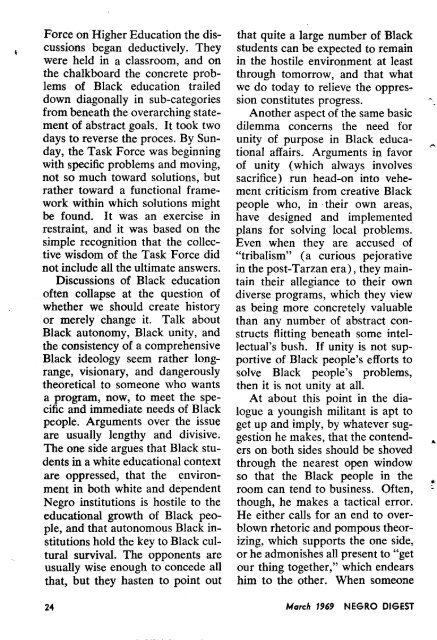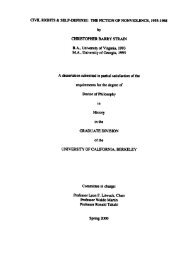Negro Digest - Freedom Archives
Negro Digest - Freedom Archives
Negro Digest - Freedom Archives
You also want an ePaper? Increase the reach of your titles
YUMPU automatically turns print PDFs into web optimized ePapers that Google loves.
Force on Higher Education the discussions<br />
began deductively. They<br />
were held in a classroom, and an<br />
the chalkboard the concrete problems<br />
of Black education trailed<br />
down diagonally in sub-categories<br />
from beneath the overarching statement<br />
of abstract goals . It took two<br />
days to reverse the proces . By Sunday,<br />
the Task Force was beginning<br />
with specific problems and moving,<br />
not so much toward solutions, but<br />
rather toward a functional framework<br />
within which solutions might<br />
be found . It was an exercise in<br />
restraint, and it was based on the<br />
simple recognition that the collective<br />
wisdom of the Task Force did<br />
not include all the ultimate answers .<br />
Discussions of Black education<br />
often collapse at the question of<br />
whether we should create history<br />
or merely change it. Talk about<br />
Black autonomy, Black unity, and<br />
the consistency of a comprehensive<br />
Black ideology seem rather longrange,<br />
visionary, and dangerously<br />
theoretical to someone who wants<br />
a program, now, to meet the specific<br />
and immediate needs of Black<br />
people . Arguments over the issue<br />
are usually lengthy and divisive .<br />
The one side argues that Black students<br />
in a white educational context<br />
are oppressed, that the environment<br />
in both white and dependent<br />
<strong>Negro</strong> institutions is hostile to the<br />
educational growth of Black people,<br />
and that autonomous Black institutions<br />
hold the key to Black cultural<br />
survival. The opponents are<br />
usually wise enough to concede all<br />
that, but they hasten to point out<br />
24<br />
that quite a large number of Black<br />
students can be expected to remain<br />
in the hostile environment at least<br />
through tomorrow, and that what<br />
we do today to relieve the oppression<br />
constitutes progress .<br />
Another aspect of the same basic<br />
dilemma concerns the need for<br />
unity of purpose in Black educational<br />
affairs . Arguments in favor<br />
of unity (which always involves<br />
sacrifice) run head-on into vehement<br />
criticism from creative Black<br />
people who, in their own areas,<br />
have designed and implemented<br />
plans for solving local problems .<br />
Even when they are accused of<br />
"tribalism" (a curious pejorative<br />
in the post-Tarzan era), they maintain<br />
their allegiance to their own<br />
diverse programs, which they view<br />
as being more concretely valuable<br />
than any number of abstract constructs<br />
flitting beneath some intellectual's<br />
bush. If unity is not supportive<br />
of Black people's efForts to<br />
solve Black people's problems,<br />
then it is not unity at all .<br />
At about this point in the dialogue<br />
a youngish militant is apt to<br />
get up and imply, by whatever suggestion<br />
he makes, that the contenders<br />
on both sides should be shoved<br />
through the nearest open window<br />
so that the Black people in the<br />
room can tend to business . Often,<br />
though, he makes a tactical error .<br />
He either calls for an end to overblown<br />
rhetoric andpompous theorizing,<br />
which supports the one side,<br />
or he admonishes all present to "get<br />
our thing together," which endears<br />
him to the other . When someone<br />
March 1969 NEGRO DIGEST
















